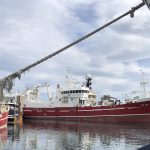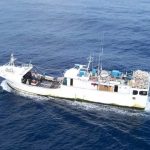The European Commission has today agreed in principle on the contents of an emergency package of measures to tackle the fuel crisis in the fisheries sector (IP/08/960). It will take primarily the form of a proposal for a Council regulation instituting an ad hoc special, temporary regime which will derogate from some provisions of the European Fisheries Fund (EFF) regulation for a period of two years. This information will serve as a basis for discussions in Agriculture and Fisheries Council in Luxembourg on June 24 and the Commission plans to adopt a formal proposal on this subject early in July.
Four types of measures are envisaged:
emergency measures
measures for the benefit of those fleets which will engage into a major restructuring effort.
market measures to increase the value of fish
measures facilitating the use the EFF.
1. Emergency measures
Exceptional emergency aid for temporary cessation of fishing activities
In order to allow Member States and fishing enterprises to elaborate the necessary restructuring and adaptation initiatives, it is proposed to allow Member States to grant emergency aid under the form of financing the temporary cessation of fishing vessels for max. 3 months (to be started before 31.12.2008). Such a measure may finance crew costs and fixed costs of vessels. This measure will only apply in cases where there is an explicit commitment that the enterprises benefiting from it will be included in a restructuring plan within 6 months (failing which the aid must be repaid).
The total public financial contribution to this measure shall be capped, and will be shared between Member States in accordance with EFF national financial allocations. However, the Commission is ready to examine mechanisms to increase the amount (through national funds) for those individual Member States where the amount appears to be disproportionately low in relation to aid needed. This temporary cessation shall not be taken into consideration against the limits (duration and budget) set by the EFF Regulation.
This temporary cessation should be tailored with a view to enhancing economic benefits by supporting stock recovery and/or by promoting more favourable marketing conditions. To that effect, MS are encouraged to link the period of temporary cessation with considerations of biological dynamics, seasonality and market dynamics.
Increase the EFF aid intensity for fuel-saving equipment
It is proposed to apply a lower rate for mandatory private financial participation (40%) for investment on board concerning equipment which helps to significantly reduce fuel consumption.
Expertise in relation to energy audits and the development of restructuring plans
It is proposed to adjust EFF rules on collective actions to make sure MS can provide financial assistance to vessel owners for seeking expertise in relation to energy audits and expert advice on the development of restructuring/modernisation plans.
Expand the rank of eligible beneficiaries of EFF Socio-economic measures
Currently EFF early retirement aid is granted only to fishermen. It is proposed to allow such aid also for workers in fisheries-related activities (auction halls, port services etc.), in order to tackle the difficulties arising from situations where ports are scattered along the coasts and closures and consolidations are expected as a consequence of reduced fishing activities.
Promote research on technical improvements for vessels/engines/equipment/gear to reduce fuel consumption and extend the eligibility of pilot projects
Research activities concerning energy efficiency in fishing remain vital in the longer term. More funds should be made available for technical developments for fuel savings. It is proposed to amend EFF eligibility rules to enable MS to promote pilot projects concerning technical improvements aiming at reducing fuel consumption.
De minimis aid
Currently de minims rules limit of 30,000 € are applicable on a company basis, which creates large disparities in relation to the benefit fishermen can obtain from Member States regimes financed under the de minims threshold. Based on further economic analysis, it could be considered to modify the de minimis regime for the fisheries sector by allowing the concession of the €30,000 de minimis aid per vessel instead of per firm, but with an overall cap of 100,000 € per enterprise.
2. New options accessible only to fleets involved in restructuring (Fleet Adaptation Schemes, FAS)
Facilitate access to EFF premiums for permanent cessation of fleets in restructuring
It is proposed to derogate EFF rules in order to lift any limitation to the access of permanent cessation premiums for the fleets involved in the Fleet Adaptation Schemes.
Additional aid for temporary cessation
It is proposed to allow vessels involved in Fleet Adaptation Schemes to receive aid for additional months of temporary cessation to be carried out before 31.12.2009. This temporary cessation shall not be taken into consideration against the limits (duration and budget) set by EFF Regulation. It will be consented within the following thresholds:
3 months to vessels which are going to be scrapped or to change engine; a maximum of 3 additional months may be allocated after 1.1.2010 in case restructuring is still ongoing
1.5 months to any other vessel involved in the FAS.
Such measure will finance crew costs and vessel fixed costs.
Increase the aid intensity for modernisation schemes
Currently the mandatory private financial participation in relation to financing investments on board is 60% and 80% for gear and engine replacement, respectively. In order to provide a substantial additional incentive for fishing companies to use more efficient vessels and gears, it is proposed to reduce the mandatory private financial participation. The actual percentage will be defined by Member States on the basis of objective criteria such as the age of the vessel and the degree of capacity reduction included in the restructuring plan. The minimum mandatory private financial participation should not be less than 40% of the costs.
Allow the granting of partial decommissioning aid in case of replacement of an old vessel with a new smaller and more energy efficient vessel
It is proposed that a vessel owner scrapping one or more vessels and replacing it by a new one, which is smaller and less fuel consuming, may be allowed to receive the scrapping premium (i.e. “partial decommissioning”) in relation to the capacity withdrawn. Member States shall be allowed to finance partial decommissioning only within the limit of the GT re-allocation possibilities as defined in Article 11(6) of Regulation 2371/02. It is proposed that this limit, which is currently fixed at 4% of the total capacity per Member State withdrawn with public aid, is increased to 16%.
This proposal introduces more flexibility into scrapping policies. It must however be carefully designed to support fleet restructuring but also the overarching policy objectives of conservation. The capacity of the new vessel shall be smaller than the withdrawn capacity; the maximum replacement ratio allowed per vessel should not be higher than 1:2. The rate could be raised to 66 % for vessels < 8 years old and for which fuel represents on average at least 50% of the production cost. Where a partial decommissioning involves a reduction of GT capacity of at least 66% of the original GT capacity the purchase of the new engine on board a new vessel using the remaining GT capacity of 34% can be financed with a minimum mandatory private financial participation of not less than 40% of the costs. Social aid in the form of decreased social security contributions Currently the Community guidelines on state aid to maritime transport allow the possibility for Member States to reduce the rates for social security contributions for seafarers employed on board ships registered in a Member State. A number of Member States make use of this possibility for the maritime transport sector. In view of the importance of safeguarding high quality employment it is proposed to mirror this possibility in the guidelines for the examination of state aid to fisheries and aquaculture while limiting it only to the contributions payable by fishermen (and not the contribution payable by the enterprises employing them), and provided that there is no associated reduction in the habitual remuneration of the employees in question by the employer. This will bring about a direct benefit to employed fishermen, as these are able to continue receiving the benefits of social security while they may be allowed to pay a decreased social security contribution. The measure would be possible for a maximum period of two years. 3. Market measures to increase the value of fish Enhance EFF use in the area Member States should be encouraged to promote actions aiming at improving the value of fish by using the largely unexploited possibilities offered by the EFF. It is proposed that the Commission engages actively in promoting initiatives on: increasing fishermen's bargaining position vis-à-vis the processing industry and distributors, by joining forces within larger POs or local marketing associations a price monitoring system will be established to better understand the factors determining market prices improving predictability of sourcing for EU origin products for the industry promoting quality initiatives e.g. labelling and better handling and processing promoting information to consumers (health, nutrition, responsible fishing, etc.) market audit/assessment, developing tools to analyse value chain and prices verify the correct implementation of monitoring/labelling measures and fighting against IUU New projects to be coordinated and financed by the Commission In addition, it is proposed that the Commission launches ad hoc projects in cooperation with the sector in the area of market monitoring, labelling etc. These projects will be financed by €20-25 million redirected from the CFP (2nd instrument) budget. 4. Measures facilitating the use of the EFF instrument Reprogramming Member States are strongly encouraged to use the EFF to the greatest extent possible, where necessary by adjusting operational programmes, with a view to maximising the financial support to initiatives aiming at tackling the fuel crisis. Strengthening EFF support to these initiatives may in some cases only require a re-distribution of funds between measures within Axis 1 (adjustment of the Community fishing fleet), which can be decided autonomously by the Member States. In other cases, it will require a programme modification. The Commission will commit to examine and approve all such modifications in the shortest timeframe possible to allow for their rapid implementation. Easing the use of EFF funds In order to make it easier for those Member States that may have difficulties in quickly making available the national financial counterpart to co-finance Axis 1 measures, it is proposed to increase the permitted EFF co-financing rates for actions taken in the context of the proposed ad hoc measure to up to 95% of the total public expenditure. In addition, it is proposed to double the EFF pre-financing amount paid by the Commission after the adoption of the operational programmes, from the current 7 % to 14% of the total EFF contribution to the operational programme, i.e. a total amount of 600 million €. This will considerably increase the funds immediately available for Member States to quickly pay for emergency measures.








